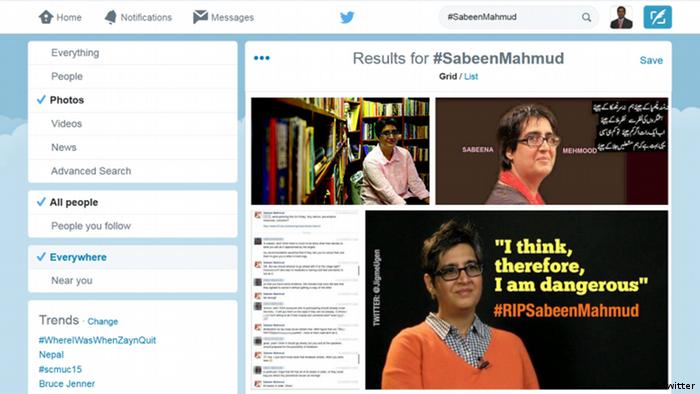Pakistani military's alleged rights abuses in western Balochistan province have come under scrutiny after the killing of activist Sabeen Mahmud in Karachi. Mahmud held a talk on the issue right before she was shot dead.
The murder of Sabeen Mahmud on Friday has turned the spotlight on Pakistan's conflict-ridden Balochistan province and the Islamic country's powerful army's human rights violations in the region.
Balochistan, which borders Afghanistan and Iran, is rich in oil, gas, and minerals, yet it remains Pakistan's poorest province. Rebel groups have waged a separatist insurgency in the province for decades, complaining that the central government in Islamabad and the richer Punjab province unfairly exploit their resources. In 2005, Islamabad reacted to the insurgency by launching a military operation in the province.
Mahmud, the 40-year-old civil liberties activist and social worker was director of The Second Floor (T2F), a community space for open dialogue. On Friday, T2F organized a talk called "Unsilencing Balochistan Take 2," featuring two prominent Baloch rights activists - Mama Abdul Qadeer and Farzana Baluch - who have been campaigning for the missing Baloch people. Rights groups say these people have been illegally detained by the military's intelligence agencies.
Local rights groups have the details of 8,000 people who they say have been disappeared over the past ten years and have not been seen since. According to the Asian Human Rights Commission (AHRC), 23 bullet-riddled bodies of these missing persons were discovered in different parts of Balochistan in January 2012. From August 2011 to January 2012, 56 Baloch people are known to have been murdered and dumped on roadsides, according to AHRC.
Pakistani security agencies claim these people were arrested on terrorism charges. However, the whereabouts of these people are kept secret from the public; they have not been presented to local courts for a proper trial.
Observers say that Balochistan, despite major development projects initiated by Islamabad, including the recently-signed $46 billion China-Pakistan Economic Corridor (CPEC) project, remains a no-go area for the media. The local media rarely reports about the rampant rights abuses in the province, whereas Baloch activists are constantly harassed and kidnapped by security agencies, say analysts.
Qadeer and Baluch had originally been scheduled to speak at a seminar titled 'Unsilencing Baluchistan' at the Lahore University of Management Sciences some weeks ago. The event was canceled, reportedly after pressure from Inter Services Intelligence (ISI), Pakistani army's spy agency. That's when Mahmud decided to invite the two Baloch nationalists to a seminar at T2F, defying the pressure from the authorities.
But it seems that Mahmud's death has broken the silence surrounding Balochistan, as more Pakistanis are talking about the province.
Pakistan's Nobel laureate for Peace, Malala Yousafzai, also condemned Sabeen's murder.
Malala Condemns Tragic Killing Of Pakistani Human Rights Activist #SabeenMahmud #RiseforSabeen bit.ly/1Gt8ZOQ




No comments:
Post a Comment